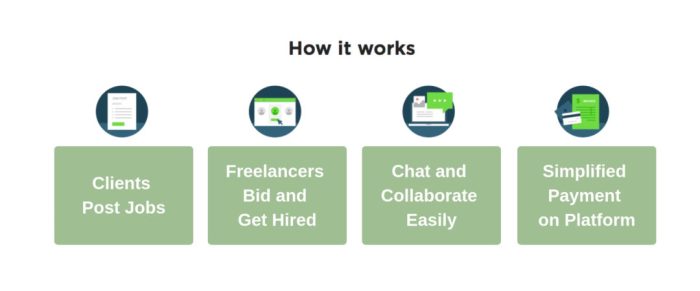Freelancing Tips and Tricks, let’s dive into the world of independent work where creativity meets entrepreneurship. From finding opportunities to managing clients, this guide has got you covered.
Whether you’re a seasoned freelancer or just starting out, these insights will take your freelance game to the next level.
Overview of Freelancing
In the world of hustling and bustling, freelancing is all about being your own boss, setting your own schedule, and working on projects you are passionate about without being tied down to a specific employer.
Define Freelancing
Freelancing is essentially working independently on a contractual basis, offering your skills and services to multiple clients rather than being employed by one company full-time.
Benefits of Freelancing
- Flexibility to work from anywhere, anytime
- Ability to choose projects that align with your interests and expertise
- Potential for higher earnings based on skills and demand
- Opportunity to build a diverse portfolio of work
Challenges of Freelancing
- Irregular income streams and uncertain workload
- Self-discipline and motivation to stay productive without a traditional office environment
- Handling administrative tasks such as invoicing, taxes, and client communication
- Lack of employee benefits like health insurance, retirement plans, and paid time off
Finding Freelancing Opportunities
Finding freelancing opportunities can be a game-changer for your career. Here are some ways to secure gigs and stand out from the competition.
Different Platforms for Freelancers
- Upwork: One of the largest freelancing platforms with a wide range of job categories. Pros include a large pool of clients and opportunities. Cons may include high competition and fees.
- Fiverr: Known for its gig-based system, Fiverr allows freelancers to showcase their skills through packages. Pros include a straightforward platform and diverse projects. Cons might involve lower pricing due to high competition.
- Freelancer: Offers a variety of job postings across different industries. Pros include a global reach and project bidding. Cons may include the need to bid competitively to secure projects.
Tips to Stand Out
- Optimize your profile: Make sure your profile is complete, with a professional photo and detailed description of your skills and experience.
- Showcase your portfolio: Highlight your best work samples to demonstrate your expertise in your field.
- Customize your proposals: Tailor your proposals to each job posting, showing the client that you understand their needs.
- Build relationships: Communicate effectively with clients and build a strong reputation for delivering quality work on time.
Setting Up a Freelancing Business
Starting a freelance business can be an exciting venture, but it’s important to lay the groundwork properly. Here are the essential steps to get you started:
Creating a Strong Portfolio
Building a strong portfolio is crucial for attracting clients and showcasing your skills. Here’s how you can create an impressive portfolio:
- Include a variety of your best work samples that highlight your expertise.
- Showcase projects that are relevant to the type of freelancing work you want to do.
- Add testimonials from satisfied clients to build credibility.
- Keep your portfolio updated regularly with new projects and skills.
Determining Your Freelancing Rates
Setting your freelancing rates can be challenging, but it’s important to value your work properly. Here’s how you can determine your rates:
- Research industry standards to get an idea of what other freelancers are charging for similar services.
- Calculate your expenses, including overhead costs, taxes, and desired income.
- Consider your level of expertise, experience, and the value you bring to clients when setting your rates.
- Be transparent about your pricing with clients and clearly Artikel your rates in your proposals and contracts.
Time Management for Freelancers: Freelancing Tips And Tricks

As a freelancer, managing your time effectively is crucial to ensure productivity and maintain a healthy work-life balance. Here are some strategies and tips to help you master time management in your freelance business.
Setting Boundaries, Freelancing Tips and Tricks
- Establish a dedicated workspace: Create a designated area for work to separate it from your personal space.
- Set specific work hours: Define your work schedule and stick to it to avoid overworking or distractions.
- Learn to say no: Don’t take on more projects than you can handle to prevent burnout.
Tools for Organization
- Project Management Apps: Use tools like Trello or Asana to keep track of deadlines and tasks.
- Time Tracking Software: Utilize apps such as Toggl or Harvest to monitor how you spend your time on different projects.
- Calendar Apps: Sync your schedule with apps like Google Calendar to stay on top of appointments and deadlines.
Dealing with Clients

Effective communication with clients is key to a successful freelancing business. By setting clear expectations and being proactive in your interactions, you can build strong relationships and ensure smooth project outcomes.
Tips for Effective Communication
- Listen actively to your client’s needs and requirements.
- Provide regular updates on the progress of the project.
- Be clear and concise in your messages to avoid misunderstandings.
- Ask for feedback to ensure you are meeting your client’s expectations.
Handling Difficult Clients
- Stay calm and professional, even in challenging situations.
- Address any issues or concerns promptly and seek solutions together.
- Set boundaries and communicate them clearly to maintain a healthy working relationship.
- If necessary, consider ending the collaboration respectfully and professionally.
Setting Clear Expectations
- Artikel project scope, timelines, and deliverables in writing before starting work.
- Discuss payment terms, revisions, and communication channels upfront.
- Clarify any uncertainties or questions to avoid misunderstandings later on.
- Regularly revisit and update the expectations as needed throughout the project.
Self-Promotion and Marketing
When it comes to freelancing, self-promotion and marketing are essential for attracting clients and growing your business. Utilizing various strategies can help you stand out in a competitive market and showcase your skills to potential clients.
Self-Promotion Ideas
- Utilize your own website or blog to showcase your portfolio and share testimonials from satisfied clients.
- Attend networking events both online and in person to connect with potential clients and other freelancers in your industry.
- Collaborate with other freelancers or businesses to expand your reach and tap into new audiences.
Role of Social Media in Marketing
- Use social media platforms like LinkedIn, Twitter, and Instagram to share your work, engage with followers, and connect with potential clients.
- Create valuable content that demonstrates your expertise and provides value to your audience, establishing yourself as a thought leader in your niche.
- Utilize targeted advertising on social media to reach specific demographics and increase visibility for your freelance services.
Creating a Personal Brand
- Define your unique selling proposition (USP) to differentiate yourself from competitors and showcase what makes you stand out in the market.
- Consistently use a cohesive visual identity, including a logo, color scheme, and design elements, across all your marketing materials and online platforms.
- Showcase your personality and values in your branding to attract clients who resonate with your mission and approach to freelancing.
Financial Management for Freelancers
As a freelancer, managing your finances effectively is crucial to ensure a stable and successful career. It involves budgeting, saving, handling taxes, and invoicing clients efficiently.
Importance of Budgeting and Saving
Budgeting is essential for freelancers to track their income and expenses accurately. It helps in planning for both short-term and long-term financial goals. Saving a portion of your income is crucial to build an emergency fund and invest in your business or personal development.
- Track your expenses and income regularly to create a realistic budget.
- Allocate funds for taxes, savings, business expenses, and personal spending.
- Consider using financial management tools or apps to streamline the process.
- Automate savings and set financial goals to stay motivated.
Handling Taxes and Invoicing Clients
Freelancers are responsible for managing their taxes, including income tax, self-employment tax, and any deductions or credits they may qualify for. Invoicing clients promptly and accurately is crucial to ensure timely payments and maintain a positive relationship.
- Keep detailed records of your income, expenses, and receipts for tax purposes.
- Consult with a tax professional to understand your tax obligations and maximize deductions.
- Use invoicing software or templates to create professional invoices and track payments.
- Set clear payment terms and follow up on overdue payments politely but firmly.